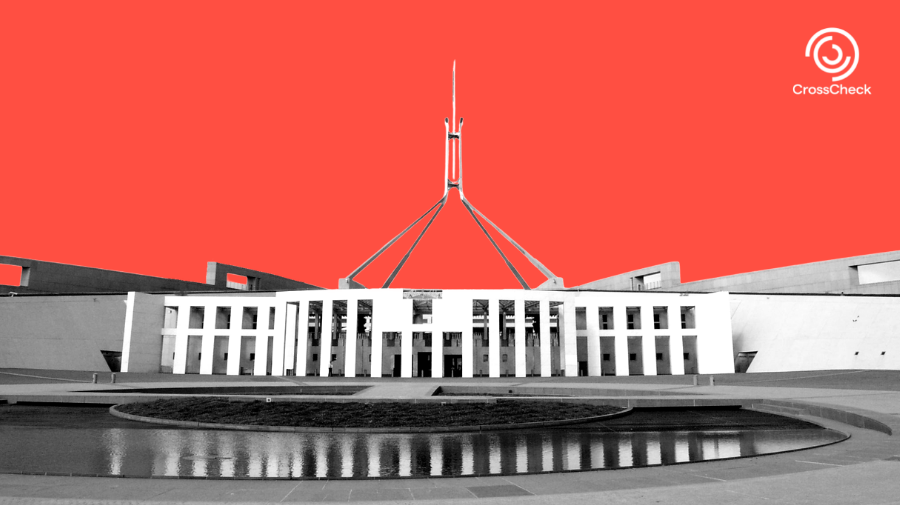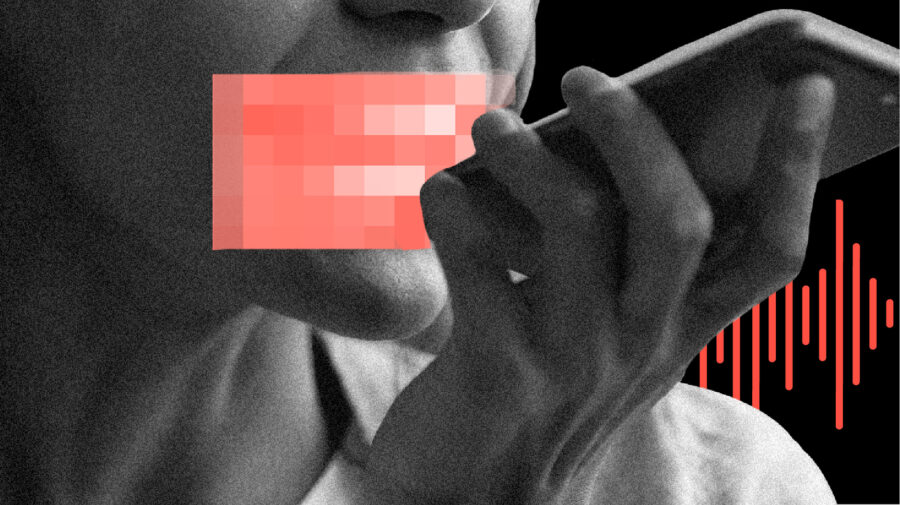When masks became mandatory in a number of countries in July, it sparked a lively conversation online. Videos of furious individuals hurling abuse at mask-wearing shop assistants went viral and anti-mask protests were covered in nightly TV news bulletins. A cursory look at social media and much of the coverage might make it seem that there was a sizable movement opposed to mask wearing, locked in furious debate with those criticizing or mocking them.
“#NoMasks ……… Now our high streets and shops will be dehumanising, dystopian hell-holes,” one UK user wrote after a government announcement making face coverings compulsory in shops. “Why is everyone losing their shit about having to cover their faces to protect vulnerable people? Those saying #NoMasks need to stop being selfish,” posted another.
Yet on closer examination, it becomes clear that what looks like a two-sided debate is in many countries a small minority provoking a backlash that ends up amplifying their messaging, raising their profiles and possibly introducing more people to a range of conspiracy theories.
Read more:
There is undoubtedly a small and vocal community of people opposed to mask-wearing, often spreading misinformation and conspiracy theories related to face coverings and the pandemic. But the structures of social media, and the focus on these online movements by the media, means these stances have been given an inflated weight. First Draft research has found that while the anti-mask movement is loud, those who broadly support mask-wearing and reject the misinformed narratives appear to outnumber those who challenge mandatory mask orders.
This dynamic became clear in the UK on July 14 when the hashtag #NoMasks, used by accounts opposed to mask wearing, trended on Twitter, creating the impression that there was a groundswell of opposition to mandatory masks.
First Draft analysis of more than 8,000 Twitter accounts posting the hashtag found the majority of people using it on the day were in fact promoting the use of face masks, with pro-mask messages far more common than anti-mask ones.
Surveys of the public from the UK Office for National Statistics suggest that 96 per cent of people in the country are wearing masks in shops, with adherence increasing weekly. Yet a glance at Twitter’s trending topics in mid-July seemed to suggest a surge of activity opposing masks.
“If someone’s on Twitter they could think this means lots of people are against masks,” said Jonathan Bright, a senior research fellow at the Oxford Internet Institute.
In fact, on the day the hashtag was trending, First Draft research shows the majority of posts retweeted and liked on the #NoMasks hashtag were supporting the use of masks. Analyzing a sample of all the tweets using the #NoMasks hashtag that were retweeted at least ten times each on July 14, First Draft found that posts lambasting others for refusing to wear masks attracted 88 per cent of the total retweets and nearly 90 per cent of the total likes.
These posts were retweeted more than 43,000 times and received more than 166,000 likes in 24 hours alone. More than seven per cent of the tweets featured the hashtags #wearadamnmask, #wearamasksavealife and #wearamask, the most common hashtags that indicated opposition or support for masks, while “selfish” and “idiots” were among the top accompanying words in all tweets on July 14.
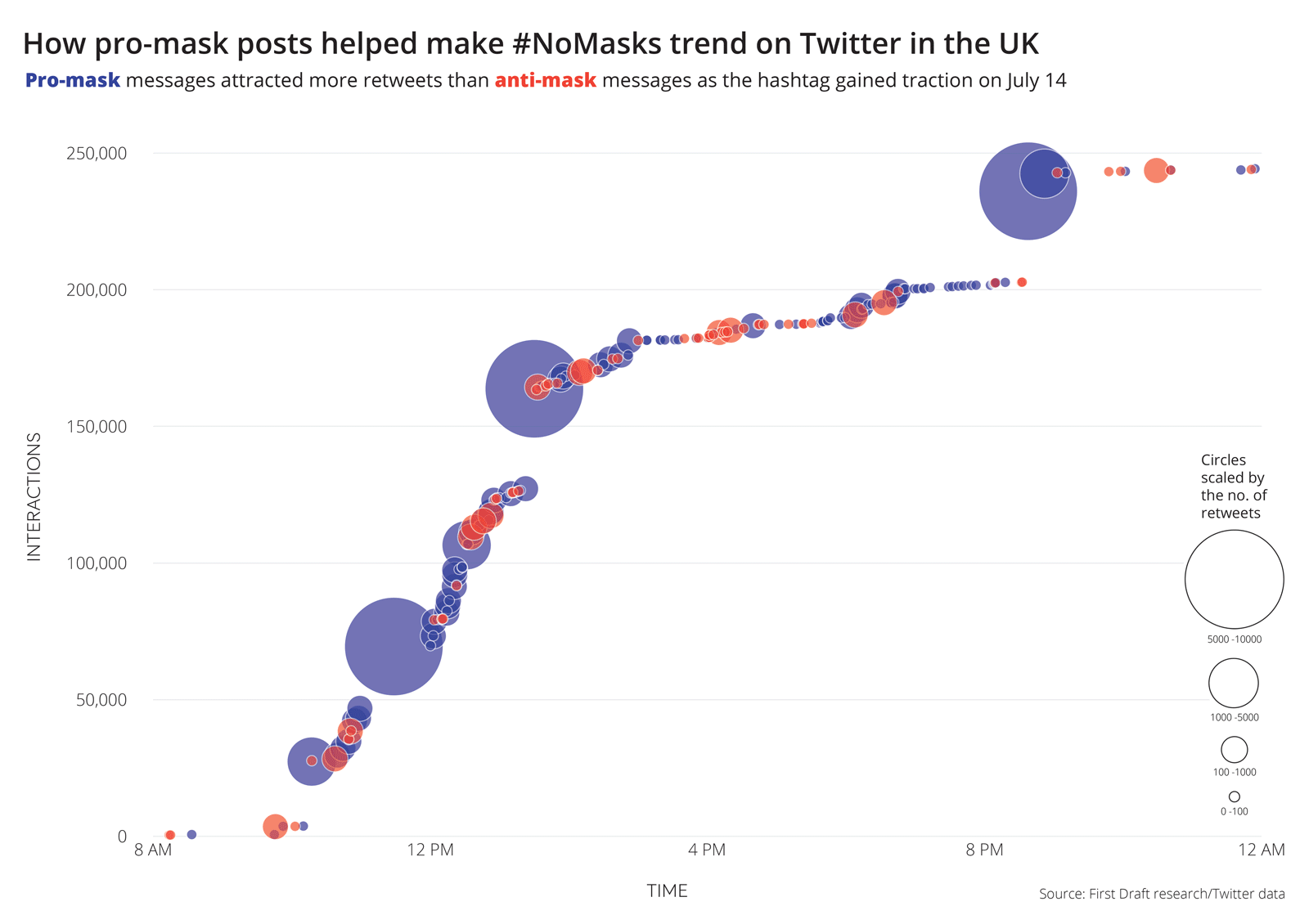
The snapshot from the UK reflects what First Draft has seen in other countries, where a noisy online minority opposed to wearing masks provokes a majority who are angry about the refusal to follow protective rules and guidelines. Wearing a face covering has become a potent political symbol, marking a divide between very different attitudes to the pandemic and measures introduced to control it.
There are, of course, mainstream political positions that provide reasons for opposing mandatory mask wearing. While concerns around stringent restrictions and directions lean into conspiratorial thinking, many of those rejecting masks appear to be genuinely concerned that mandates are an assault on their civil liberties.
Uncertainty over health guidance may also have contributed to differences in attitudes, particularly as official advice has evolved. On June 5, the World Health Organization reversed its stance that there was insufficient evidence suggesting masks prevented coronavirus spread, advising that face coverings be worn where social distancing in public is not possible.
Unclear guidelines have also plagued lockdown restrictions and mask adherence in the US and Europe. “[UK] government guidance on masks has been a bit all over the place,” said Bright, adding that even reasonable people have questioned their efficacy.
Yet those most active in opposing mask wearing, and often in spreading anti-mask misinformation online, appear to come from increasingly motivated, political fringe communities — unofficial groups holding shared beliefs or interests different to those of the wider population, and those building face coverings into larger existing conspiracy theories.
Out on the fringe
From claims that masks contain 5G antennas to assertions that mandatory mask orders pave the way for mandatory vaccinations, mask recommendations and rules have prompted a range of conspiracy theories. Many of the communities rejecting mask mandates are uniting over beliefs that measures are unnecessary or too strict, creating a patchwork of communities believing in anti-lockdown, anti-state and anti-vaccine narratives.
Analyzing use of the #NoMasks hashtag during July 2020, First Draft found that posts promoting misinformation about masks gained little traffic and remained mostly within fringe communities. But while their views remain fringe, backlash against them is boosting their profiles.
The hashtag #kbf, an acronym for anti-lockdown movement Keep Britain Free, was the second most common after #covid19 in the 33,450 tweets First Draft collected in July. It accounted for just three per cent of the total tweets, highlighting the limited impact of some of the most active anti-mask campaigners. Yet its message will have received a boost from its inclusion under the trending hashtag. The group’s founder, Simon Dolan, has raised more than £225,000 for a legal challenge against the UK lockdown and what he claims is increasing government control.
Other commonly associated hashtags, such as #plandemic and #scamdemic, reference the viral “Plandemic” video, which featured several false claims about the virus and vaccines, conspiracy theories and misinformation that the pandemic is a hoax propagated by world leaders. #nonewnormal, a phrase adopted by groups that reject mandatory regulations, appeared in 437 tweets.
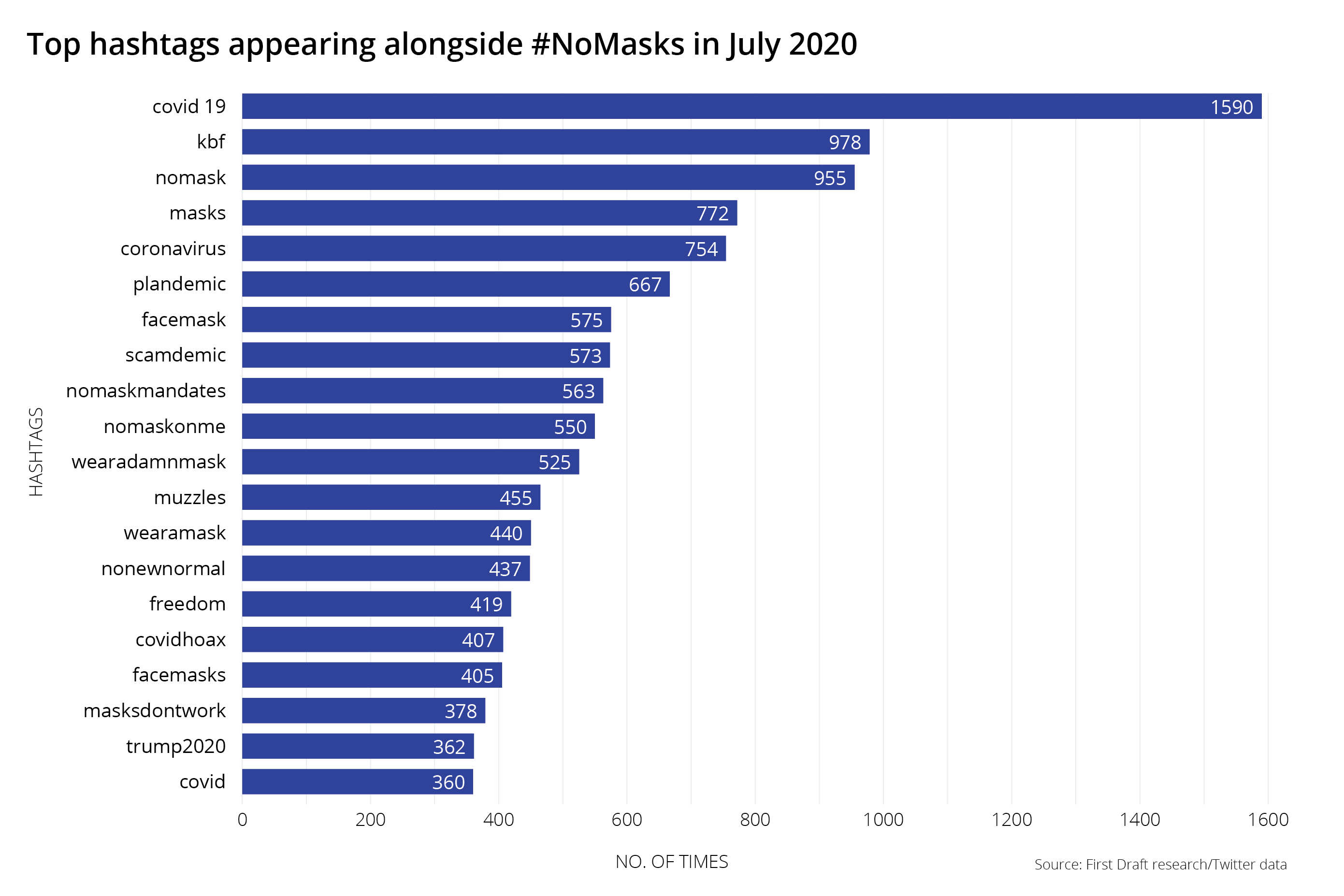
“The anti-mask movement is clearly trying to build off an existing audience base which is skeptical about the existence of Covid,” said Chloe Colliver, a disinformation researcher and head of digital policy at the Institute for Strategic Dialogue (ISD).
Anti-mask disinformation in the UK “takes some leaves out of the US playbook,” where face masks have been a contentious political issue, said Colliver.
#freedom appeared in 419 tweets alongside #nomask, in what Colliver said was a sign that libertarian and so-called “culture war” language has been imported from the US to Europe in recent years, first through the 2016 Brexit vote and now the coronavirus pandemic.
Some of the most active groups in the UK opposing the use of masks started life mobilizing against lockdown measures. Facebook Group Stand Up X, which hosts anti-mask protests across Britain, has attracted more than 22,000 members since its creation on July 5. Other than Stand Up X, most groups sharing anti-mask content in the UK have fewer than 10,000 members each.
Pointing to past research suggesting members of far-right groups are more likely to be climate change skeptics, Bright notes how harmful online communities have historically found common ground. This is more likely during times of crisis, which typically evoke feelings of uncertainty and lack of control.
“[The pandemic] is fertile ground for them to cluster together,” said Bright.
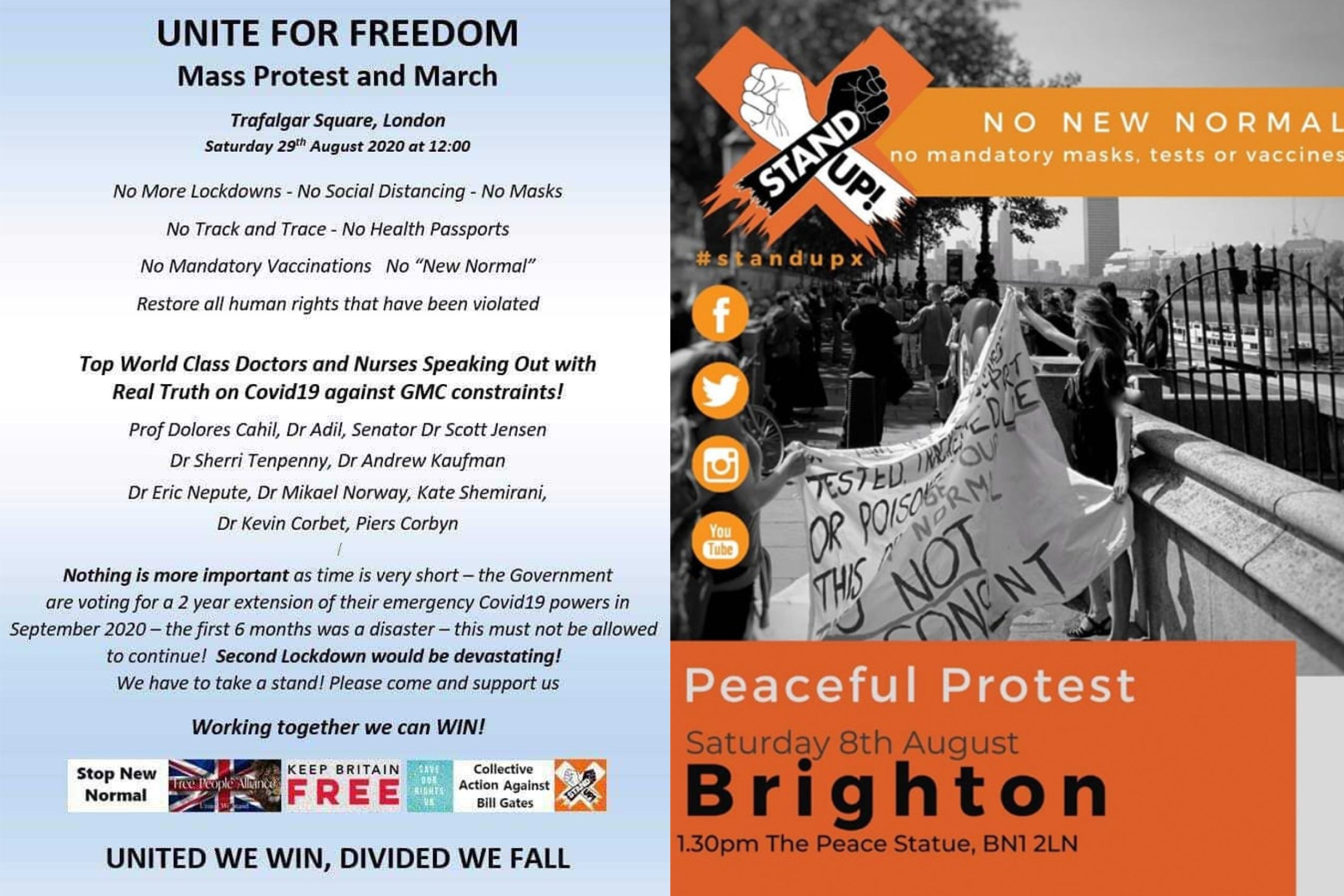
Two posters advertizing anti-mask rallies in the UK. Screenshot by author
The ‘sanitary dictatorship’
France is one of the countries where we see conspiratorial mindsets among anti-mask movements similar to those in the UK. A French-language movement opposing masks is coalescing around claims that stringent measures are part of a wider, long-term move to a totalitarian system.
Civil liberty concerns ostensibly form a core part of online discussions opposed to masks in France. First Draft’s analysis revealed that, between accounts tweeting the French hashtag “stop masks,” the most common hashtags in their Twitter bios included #jesuispatriote (“I am a patriot”) and #libredechoisir (“free to choose”).
Fifty per cent of tweets containing the French hashtag for “stop masks” between July 20 — the day masks became compulsory in France — and August 4 also included the hashtag #stopdictaturesanitaire (“stop the sanitary dictatorship”). Within tweets containing the hashtag #stopmasques, the top 20 most associated hashtags included #liberté, #statescandal, #stopauxracailles (“stop the thugs or hoodlums”), #fakepandemic and #reveillezvous (“wake up”).
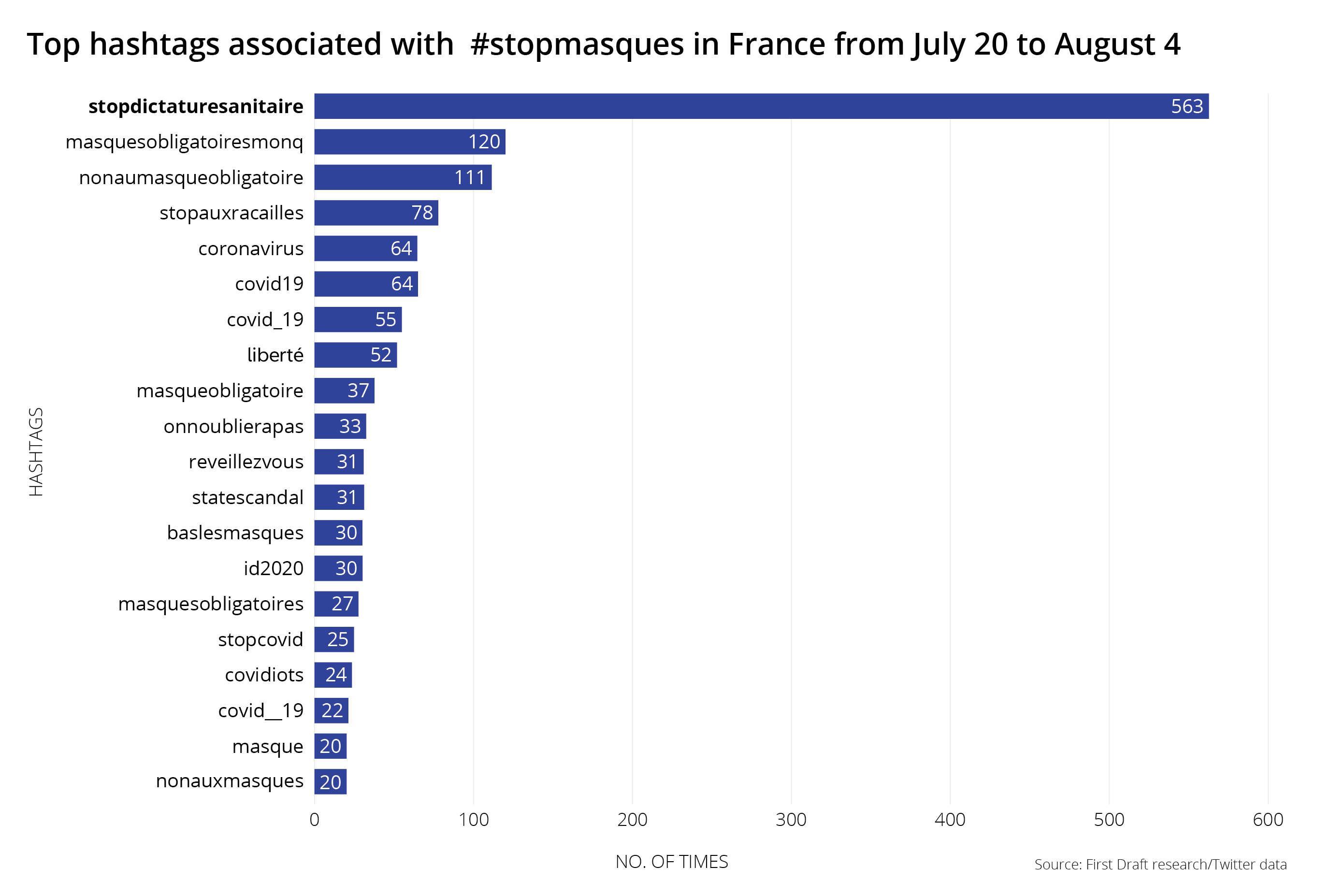
Mandates on masks have also spawned anti-vaccine disinformation in France. A blog post claiming that all events surrounding the pandemic were designed to enable mass vaccination was shared on Facebook more than 9,400 times, according to CrowdTangle, Facebook’s content tracking tool. The narrative has also taken off within memes claiming masks are a “test” for stricter measures, such as mandatory vaccines — a link that has also advanced through UK anti-lockdown groups.
Despite some instances of anti-mask misinformation flourishing, most Facebook Groups dedicated to the subject in France, as in the UK, have relatively small followings. “Regroupement contre le port du masque obligatoire” (“Consolidation against wearing a compulsory mask”) has more than 13,400 members, while three similar groups have between 1,000 and 5,500 members.
On trend
Twitter’s trending hashtags section presents the most obviously problematic way in which these fringe groups and their often-false claims are being thrust in front of a wider audience. Twitter states in its FAQs that trends are determined by an algorithm and tailored to users based on their activity. They are shaped by the consistency and reach of conversations around a given topic in a particular location, a Twitter spokesperson told First Draft via email. But this varies between trends, so it’s often unclear how many tweets have been posted for a theme to qualify.
“You don’t need that many tweets for it to be a trending topic,” said Oxford Internet Institute’s Bright. “The trending algorithm doesn’t take this into account at all.”
Twitter added that the company wants trends to promote “healthy discussions,” so it periodically prevents certain content from trending. This includes graphic or profane posts, hate speech and other content that violates Twitter’s rules.
The ISD’s Colliver suggested a proactive way for platforms to address misleading use of hashtags is consistent human review. “That wouldn’t necessarily stop a hashtag from being included if it has a more nuanced conversation behind it, but it would at least enable hashtags directly related to disinformation and conspiracy theories to be labeled or demoted from the trending section.”
The anti-mask conversation is a “perfect example” of the need for newsrooms reporting on social media trends to inspect more closely, she said. “Not digging into the nuance of the debate can be extremely misleading in terms of the scale or nature of these online conversations.”
When harmful narratives circulate primarily in niche communities and pique low levels of interest, reporting on them can amplify rumors that would otherwise remain on the fringes. A precise analysis of trends could help journalists and researchers discover whether a given narrative has passed a certain threshold of shares and crossed over into the mainstream.
Instead, the amplification of anti-mask chatter by both social media platforms and the media is giving the impression that the trend is more ubiquitous than it actually is. In reality, it appears that most people support the wearing of masks — so much so that they’re happy to tweet about it and ridicule those who don’t.
Data visualizations by Ali Abbas Ahmadi and Carlotta Dotto.
This article is part of a series tracking the infodemic of coronavirus misinformation.
Stay up to date with First Draft’s work by becoming a subscriber and following us on Facebook and Twitter.
Note on methodology
We gathered 33,450 Twitter posts containing the #NoMasks hashtag in July 2020 and 1,660 posts with the French hashtag #StopMasques between July 20 and August 4. Both scrapes contained only original tweets, excluding retweets and comments. Some tweets might have been taken down since July, making it difficult to ascertain how comprehensive the sample is.
We analyzed the trend over time and selected the most common hashtags in the tweets. Here is the repository with data and code to reproduce the analysis.
The next step of analysis focused on the tweets posted on July 14 — the day the British government announced that masks would be compulsory in shops — to track when, how and through which accounts #NoMasks went viral.
After filtering out the false positive tweets that contained US- or Australian-focused messages, we manually analyzed the 222 resulting posts that gained at least a little traffic — more than 10 retweets — on July 14.
We then tagged them based on whether they were “Pro-Masks” or “Anti-Masks” and analyzed both groups by top associated hashtags and by the total number of retweets and likes per hour.




